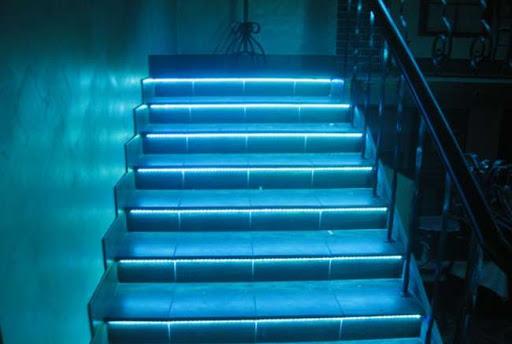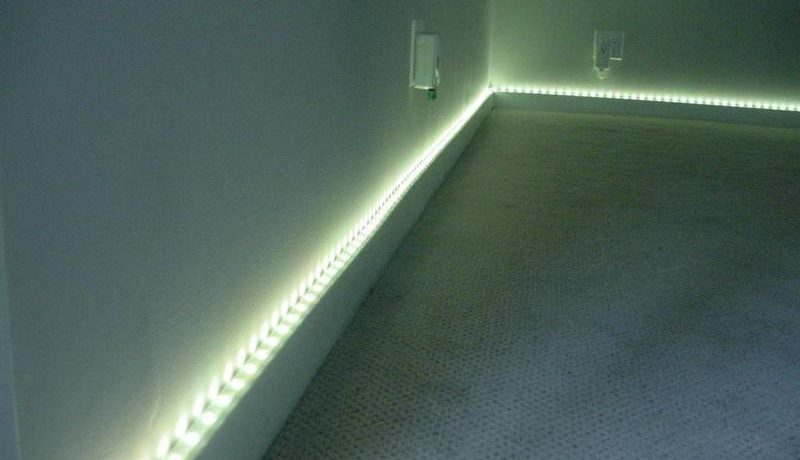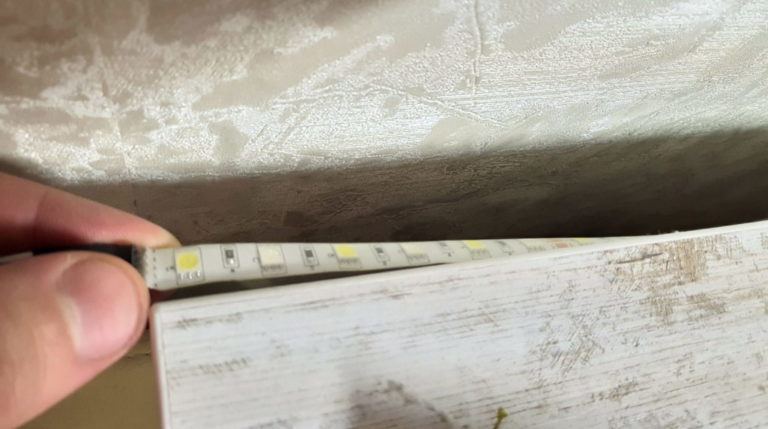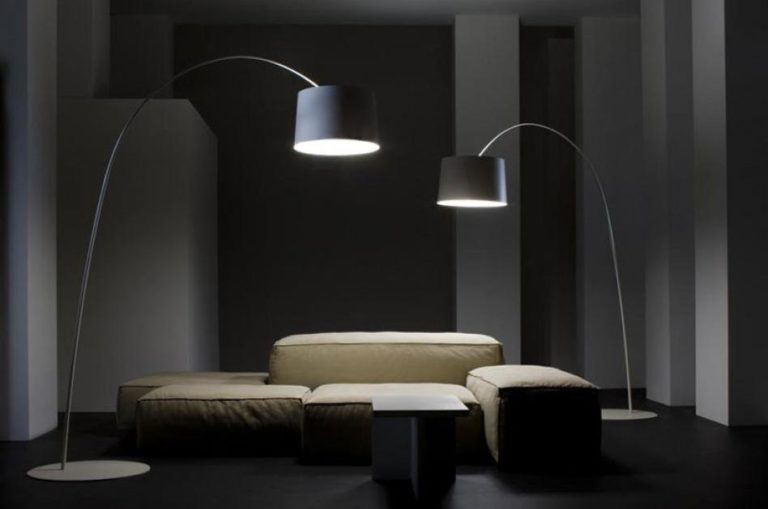Ways to use LED strips for interior decor
One of the current trends - decorating apartments with LED threads. LED strip in the interior of the room - a solution that combines beauty with use. It helps to accentuate only the areas you need, to illuminate the farthest corners. The ability to change colors and adjust the brightness gives more opportunities to create the desired lighting.
Benefits of use
The main advantage of LED-lighting - with its help, you can illuminate even the most remote corners of the room. Also LED-tape has a number of other advantages:
- The variety of colors allows you to choose a backlight to match the shade of the walls or ceiling.
- Some strips have a mode for changing colors via remote control. Due to this you can dramatically change the interior.
- The flexibility of the tape allows you to give it any desired shape and hang it on the contour of a curved niche, arches.
- The tape can give both directed and diffused light.
- LED-lighting does not give radiation, harmful to vision, and does not overheat the surface, normally "gets along" with suspended and stretch ceilings.
- The strip adds beauty and style to the room.
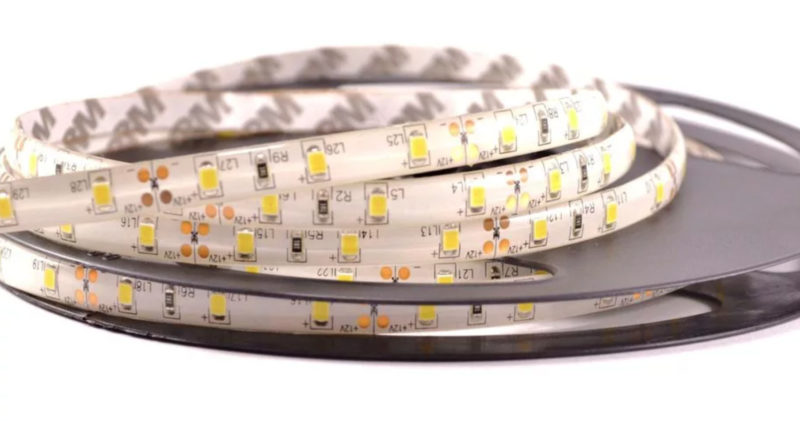
There are no noticeable disadvantages of LED strips. Is that over time the brightness of the diodes begins to decrease, but this is inevitable.
Ideas for decorating individual areas of the house with a tape LED
Often strip lighting is used to accentuate certain small areas, interior items, furniture. A few interesting ideas for the use of LED tape in the interior:
- Stairs. In private homes, the "owner" of the LED strip is often the stairs. In addition to aesthetics, it helps to walk on the steps in the dark.You can decorate the staircase light several ways: built into the railing, install it on each step or only on some, let it along the entire length of the staircase.
- Walls. By illuminating the walls, you can influence the visual perception of the room: change the height, add space, emphasize only certain areas.
- Curtains. One of the current trends curtain illumination. In addition to visually increasing the area of the room, it gives the effect of penetration of sunlight during the day.The most rational solution is to place the LED strip in a niche with a curtain rod.
- Furniture. Sofa, chair, shelf, table legs - these and other items can be illuminated to create a cozy, relaxing atmosphere in the room. And the "flying" effect will give the interior a fantasy feel.
Idea. If you place the lighting on a glass shelf, you can achieve a glowing overflow effect.
Tip. Decorate the LED-tape picture or photo on the wall - so they will always draw attention.
Decorating individual rooms
Hallway
LED lighting is a great way to add illumination to your hallway. A person who enters the house from the street, the hallway will seem visually larger than it really is. The most suitable places for LED-tape design in the hallway are:
- The doorway. An interesting, but not the most popular way. So the owners immediately show each guest creativity and ingenuity. The main thing is not to go overboard with brightness, so that from the threshold it won't dazzle. It is necessary to choose LEDs with a soft light. There are three decorating options: on top of the door, on the side walls, and all around the door portal.
- The skirting board. Lighting is attached to the floor plinth. To this end, it is worth buying special skirting boards that have a groove for the strip. This way it will be securely insulated. Without insulation on the skirting board LED lighting will be difficult to carry out wet cleaning.This is what a skirting board with backlighting looks like.
- Niches in the walls. A good place for LED lighting in the hallway are niches in the walls, if there are any. The tape is hung inside the niche around the perimeter.
- Entresols. Putting an LED strip on the mezzanine is a rational solution. Firstly, it will not take up unnecessary space, and secondly, it will illuminate the most remote corners of the mezzanine.
Idea. Make a sensor on the light so that the light comes on when the mezzanine door is opened.
Tip. The combination of multicolored lighting and a mirror in the niche will create a true extravaganza.
Living room
LED lighting in the room has one main task - to give a soft, relaxing light, creating a quiet atmosphere, as opposed to overhead lighting. At the same time the strip should act as a floor lamp for reading, writing, crafts, that is, it should be clearly visible. In the hallway, LED strips are usually mounted on floor plinths, walls and recesses under the eaves, rarely - on the ceiling. You can additionally decorate certain areas:
- around or near the TV;
- near a picture, a photograph;
- wall shelves;
- coffee table;
- arch;
- column.
Bedroom
The use of LED lighting in the bedroom should be at a minimum. The first thing that comes to mind is to decorate the bed. The ribbon is hung from the bottom of the bed, creating the effect as if the bed is not on the ground, and hangs in the air.
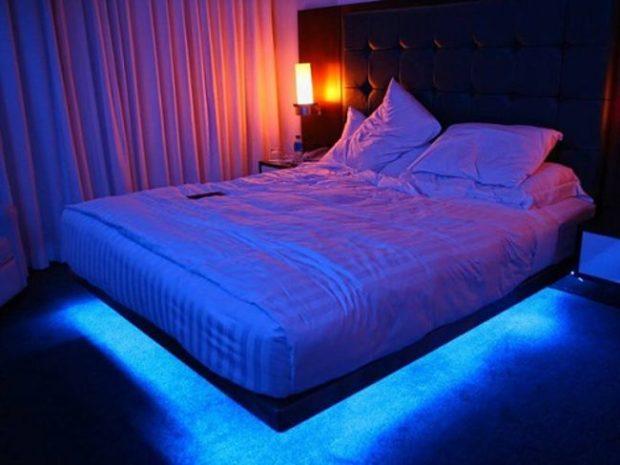
In addition, LED-ribbon can replace wall lights and help when reading or doing handicrafts. You can decorate a mirror, cornice, but not the ceiling: downward light for the bedroom - a thing inappropriate.
Idea. If the bedroom is converted into a balcony or loggia, it's worth installing LED lighting there. This will give the atmosphere of the bedroom a mystique.
Kitchen
When decorating the kitchen LED strip combines aesthetic and practical functions. You can hang it in different areas of the kitchen:
- above the table or on its circumference;
- On hinged and pull-out cabinets;
- On the refrigerator;
- On the kitchen clock.
For decorative purposes, you can place the strip on a shelf with transparent glasses, shot glasses. If the kitchen has a low ceiling, LED lighting placed over a hinged cabinet will make the room visually taller.
Video on the topic: LED lighting in the kitchen.
In the bathroom and toilet
The role of LED strip in the design of the bathroom is great. There is not much space, so you need to create a good and at the same time relevant lighting. Such definitely will not be cold white light. It is necessary to use a warm or neutral. The most obvious solution - to hang a LED thread on the mirror. Sometimes there are mirrors that are already equipped with LED-tape, but they cost a lot, so it is better to collect this puzzle in parts.
It will also be appropriate to illuminate the tub at the bottom perimeter and on the ceiling. If you turn off the main source of light, additional light is enough for an unobtrusive relaxing atmosphere. It is now popular to decorate sinks and toilets with LED threads.
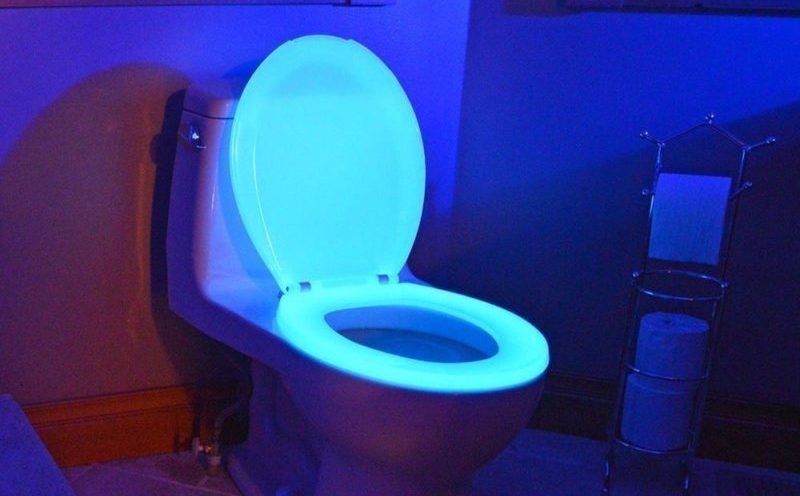
Even more spectacular it will look on the hinged plumbing, cabinets, wall shelves.
Important. LED lighting in the bathroom should be insulated as reliably as possible, because the degree of humidity is very high.
When it is appropriate to change colors and brightness
LED lighting is chosen for the design of the apartment, not vice versa: it is important not to forget about it. In some interiors (classic, country) LED threads will not look at all, and in others (minimalism, high-tech) without them it is difficult to do. In the bedroom, children's room, hallway, it is better to use lighting of one color, but in the kitchen, bathroom, living room you can safely experiment with different colors. Additionally, dimming (changing the brightness of the glow) comes in handy. It can be used to dim or increase the brightness, as well as to accentuate certain interior elements, such as columns. In the bedroom you can gradually reduce the brightness to a comfortable level for sleep, and in the kitchen with a dimmer to create the mood for a romantic dinner or a fun party with guests.
